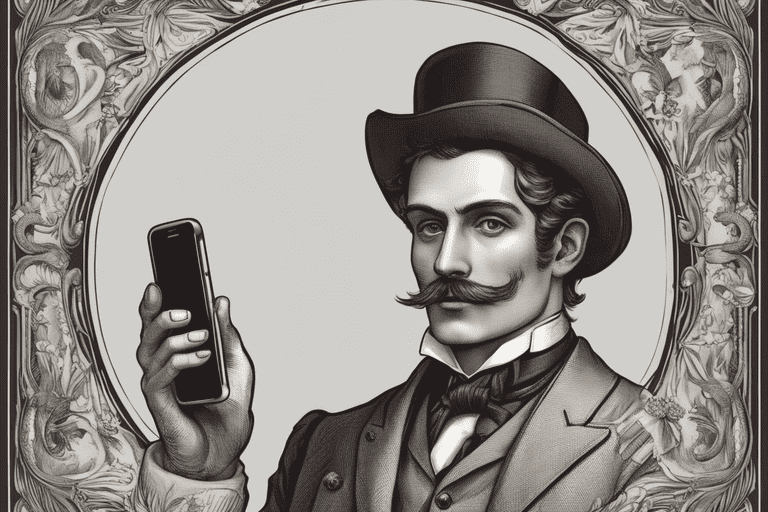Elegance in the Age of AI: Relevance of Etiquette with a Victorian Twist
The relevance of etiquette? I am one of those people who feels they are ‘out of time’ – as in while I love my technology and the ability to access information on pretty much all subjects with just a swipe and a click, I own that I do feel more comfortable with the values and manners of the late Victorian era than I do with those of the present day.
In an age dominated by artificial intelligence and rapid technological advancements, the term “etiquette” might seem like a relic of the past—a set of archaic rules that no longer hold any sway in our fast-paced, digitalized lives. However, this couldn’t be further from the truth. In fact, as we navigate the complexities of the 21st century, the importance of etiquette has never been more relevant.
The Evolution of Etiquette
Etiquette has always been a reflection of the values, norms, and expectations of a society. Throughout history, different cultures and time periods have had their own unique codes of conduct. In Victorian England, for example, etiquette was a highly structured and meticulously observed set of rules that governed nearly every aspect of social interaction. It provided a framework for individuals to navigate the complexities of class distinctions and social hierarchies.
Fast forward to the present day, and our society has undergone a radical transformation. The advent of the internet and artificial intelligence has disrupted traditional norms and introduced new modes of communication and social interaction. Many argue that the rules of etiquette have become outdated, while others contend that they have merely evolved to suit the modern landscape – and yet others cast scorn at anyone suggesting the term still has value today.
Personally, someone I know suggested I was being a “snob” and an elitist for even suggesting that there is a place for etiquette in today’s modern world.
The Relevance of Etiquette in the Age of AI
Artificial intelligence has permeated nearly every aspect of our lives. From virtual assistants like Siri and Alexa to predictive algorithms that curate our news feeds and recommend products, AI has become an integral part of our daily existence. In this digital age, etiquette extends beyond traditional social interactions—it encompasses our behaviour in the virtual realm as well.
1. Digital Communication
The rise of email, social media, and messaging apps has drastically changed the way we communicate. While these platforms offer unprecedented convenience, they also come with their own set of challenges. It’s easy to forget the importance of courtesy when hiding behind a screen. Etiquette in digital communication means being mindful of our tone, respecting others’ privacy, and refraining from hurtful or inflammatory comments.
2. AI-Enhanced Customer Service
As businesses increasingly rely on chatbots and AI-driven customer service solutions, the way we interact with these digital representatives is becoming a crucial aspect of etiquette. Treating AI-powered entities with respect and patience is not only a matter of common courtesy but also a reflection of our values as a society.
3. Data Privacy and Security
In the age of AI, the handling of personal data has become a pressing concern. Proper etiquette in this context involves respecting individuals’ privacy, obtaining consent for data usage, and taking steps to protect sensitive information. Adhering to these principles is not only good practice but also a legal and ethical imperative.

The Victorian Twist: Infusing Elegance into Modern Etiquette
While the digital age has reshaped the landscape of etiquette, it hasn’t diminished its relevance. In fact, it presents us with an opportunity to blend the time-tested elegance of Victorian etiquette with the demands of contemporary society. Here are some ways we can achieve this fusion:
1. Politeness and Respect
The Victorians placed a strong emphasis on politeness and respect in their interactions. In the modern world, we can carry this tradition forward by being courteous and respectful in our online communication. This includes refraining from using offensive language, listening actively to others’ opinions, and acknowledging the value of diverse perspectives.
2. Thoughtful Communication
In the era of instant messaging and social media, thoughtful communication can stand out as a beacon of etiquette. Take the time to craft well-thought-out responses, consider the impact of your words, and engage in constructive conversations. Avoid the pitfalls of impulsive, emotion-driven communication that can lead to misunderstandings and conflict.
3. Empathy and Understanding
The Victorians understood the importance of empathy in human interactions. In today’s world, where technology often serves as a barrier to understanding, cultivating empathy is essential. Use AI and technology as tools to enhance your understanding of others’ perspectives, rather than as a means to isolate yourself from human connection.
4. Privacy and Security
Respecting privacy and security in the digital age is a contemporary extension of Victorian etiquette. Just as the Victorians valued discretion and confidentiality, we should prioritize the protection of personal data and respect individuals’ digital boundaries.
The Timeless Value of Etiquette
Etiquette is far from obsolete in the age of AI and digitalization. Rather, it has evolved to encompass the challenges and opportunities presented by modern technology. The principles of politeness, respect, thoughtfulness, empathy, privacy, and security remain as relevant as ever.
By infusing a Victorian twist into our approach to etiquette, we can add a touch of elegance to our interactions in the modern world. Just as the Victorians used etiquette to navigate the complexities of their society, we can use it to navigate the complexities of ours. In doing so, we not only honour a tradition that has stood the test of time but also contribute to creating a more civil, empathetic, and harmonious digital society—one where the elegance of etiquette continues to shine brightly.
~ Bella
